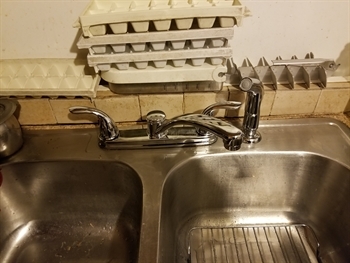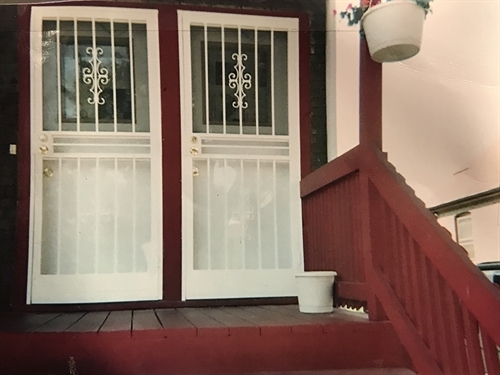Constructing Communities: The SARFS Program at the GAGDC
Ian Grant-Funck
Published: July 26, 2017
The Small Accessible Repairs for Seniors (SARFS) program is a program that provides seniors with minor home maintenance so that their homes are safer, more secure and more accessible. Without these repairs, clients would not be able to stay in their homes comfortably. SARFS is made possible through a city-funded grant. It has been managed at the Greater Auburn Gresham Development Corporation since 2003 by Ms. Linda Johnson.
The Greater Auburn Gresham Development Corporation (GAGDC) is a nonprofit organization that promotes comprehensive community development in all or parts of Auburn Gresham, Ashburn, Englewood, Greater Grand Crossing, Washington Heights, West Englewood, and West Chatham. Through programs promoting education, housing, economic development, health and senior services, the GAGDC works to make Chicago resources more available and Chicago opportunities more equitable.
The GAGDC has been a delegate agency for the SARFS program since 2002 and has attended to more than 500 homes in their service area. Installations include grab bars for bathrooms, handrails, banisters, new doors, new toilets, floor replacement, locks, faucets, fire extinguishers, and carbon monoxide and smoke detectors. Because retired persons and seniors who have lost their primary source of income are by and large extremely active in the communities where they live, this program helps maintain both home ownership and the health of the community overall.
The Contractor
“Think ahead because the most important thing in the world is to see a problem and think about how you can solve it…you got to look beyond. You can’t decide how to cross a street from the middle of the intersection.” –Mr. Granville Love
Mr. Granville Love is one of two contractors working with the GAGDC on the SARFS program. A soft-spoken but passionate speaker, with a slight southern accent betraying his roots, Mr. Love’s endless expertise in everything construction stretches back to his early twenties when he was first trained at, and began to manage, a Lumber yard in Arkansas. Since then he’s worked in steel, carpentry, home repair, and other construction jobs. When he was a truck driver, he even shipped construction materials and was quick to declare that he could drive his twin-shift transmission semi-truck full of goods backward and uphill faster than I could drive normally in a car.
On Christmas Eve in the year 1969, he moved to 79th and Morgan in Auburn Gresham and has lived there ever since. There he raised three children, and although they’re now grown, in Mr. Love’s house, “the rules stay the same till I die.” The value that serves as the basis for all his rules is this: “treat folks right, help them.” It’s as simple as that, and this strict morality is built right into his daily life—it governs how he works on the SARFS program houses: “I’m here to do what they want me to do, to satisfy my customers. After 15 years I have never not satisfied anyone.”
Like many Auburn Gresham residents, Mr. Love believes in the importance of home ownership—and for him, SARFS is a chance to “help out the homeowners, because you gotta give the homeowner the chance.” After all, homeowners have “a prime duty to the house.” However, Mr. Love understands the limitations of the SARFS program. First off, most of the funding comes from a city grant, and continues to be underfunded: “this program, it takes money and the system don’t want to pay…they don’t give enough. We need more funding because now everything is going up, and people don’t have the money like they used to with kids and grandkids in school.”

This funding problem presents a challenge to one of Mr. Love’s core values, something he repeated again and again while we spoke. He said: “If you ever fix a house or whatever you fix, make sure it's fixed for more than five years.” Unfortunately, sometimes the cheaper, shorter lasting material is all that fits in the budget—but Mr. Love has a way to fix that too: “if my material exceeds my income, I supply what people need. I do it for nothing. Sometimes I don’t get paid and it don’t bother me.” He pays for the material himself, takes pay cuts to open up budgetary space, and sacrifices his wages before changing anything about the service his mom-and-pop construction company offers.
And why? Why would any business owner do this? Because more than a business owner, Mr. Love is a neighbor who follows his own rules—in his words: “eighteen-dollars ain't gonna kill me.” When I asked him how he felt about Auburn Gresham, the almost 50-year resident said “this place, I love it;” and when asked about the SARFS program, he said, “I like it, that’s all I say, is I like it.”
“If you want something made, say so. I can fabricate it”—Mr. Love was referring to his ability with a table saw; yet, he constructs more than new banisters. Because he is keeping people in their homes, he is constructing the neighborhood for years to come. His work continues into the beyond with no plans for stopping.
He tilted his head down so he could peer over his glasses at me for emphasis and said, “my birthday was two days ago. I woke up and I had a job. I wake up every morning and know God gave me seventy-seven years and a good job, and all but two of those years, I have a job on my birthday. I thank God for that.”
The Client
“To own a home is the best thing that you can do.” –Ms. Mary Clay
Ms. Mary Clay exudes an understated yet unapologetic poise with every step she takes. Her resonant speaking voice betrays a past life as a professional singer and her kind eyes are the first sign of the life full of love that she lives. She is the president of her church choir and assists with a program that provide dinners and social opportunities to local seniors through her position.
She first became aware of the barriers to remaining in a home for seniors while caring for her aging mother—who passed three years ago. Between high toilets and banisters for stairs—not to mention the standard repairs that come with owning a home for several generations, the nearly 100-year-old house that Ms. Clay shared with her mother was in need of some small upgrades. Her mother lived there more than 60 years.
After 39 years as an insurance broker, during which she “watched the new generation come in, learned the computer, and taught the younger people,” she knew it was time to retire, if only because “Younger people don’t want to accept older people telling them what to do.” Unfortunately, the drop in income from a regular salary to social security checks surprised Ms. Clay: “You don’t realize what’s really going on. You think you’ve got it made and then you don’t.”
In addition to needing banisters and high toilets, Ms. Clay had a door and a sink that were both more than ten years old and were coming apart. She was determined to keep up her house: “What you need is what you need to have.” So when she found out about the program through her local alderman’s office (6th ward) she immediately signed up.
Fortunately for Ms. Clay, she only spent three months on the waiting list—a relatively short time considering there are more than 100 homes waiting and only around 60 homes a year are serviced. 60 homes a year is quite impressive, to be fair, as the City’s budget for programs such as SARFS is limited.
Three months after Ms. Clay called in, Mr. Love reached out to her to ask what time she would like he and his crew to come in. This choice surprised Ms. Clay—she was not expecting to be treated as a client and wanted to know what time Mr. Love wanted to come in. He insisted, and she decided on 10 am. Mr. Love and TEAM construction were finished with the half dozen home repair projects by 5 pm.
When asked if she was satisfied with the service, Ms. Clay went on and on—“ Mr. Love, he knows his business…Sometimes contractors just go to lunch and do this and that but he just did it... Do I have high standards? Yes, I do!” To illustrate this point, she told me about a contractor she hired several years prior: “I had one guy who just messed up my porch and I just threw away money. ” She said again and again that she was nothing but impressed with SARFS, calling the program “exciting” and “very professional.” Without these improvements, Ms. Clay knows she would have had to move out of her home sooner rather than later.
Four months later, Ms. Clay proclaims: “I’ve started really enjoying my home now.” Her house is also home to one of her granddaughters, who Ms. Clay is taking an active role is raising. This young woman is currently a dedicated student at Perspective Charter School (Auburn Gresham campus) and wants to attend Columbia College in Chicago to study dance. Ms. Clay hopes she learns several languages and travels the world. If Ms. Clay lost the chance to stay in her house, it would also mean her granddaughter would lack a place to sleep. Benefits to family members are just one of the many domino effects of keeping seniors in their houses.
Home ownership is considered the best way to accrue wealth. Also, nursing homes are expensive and tend to take money out of the local economy, and retaining residents is key to the health of any block. After all, “Something is better than nothing but having a home is better than something.”
Retiring or losing the financial breadwinner can be stressful—but there’s no doubt that after years and years of work, seniors like Ms. Clay have earned the right to decide it's time for them to take back their days, and pass the baton on to younger workers. Ms. Clay said three separate times that she’s in control—“It's my day. It's for me.”
The fact that she gets to spend her day in a home she is comfortable in is the real victory of the SARFS program. It ensures the happiness of these seniors so that even when something surprising happens, livelihoods are not threatened. As Ms. Clay says: “when you retire, you think you have enough money (for repairs) but then, right then and there, you don’t have the money.” Thanks to SARFS, however, you don’t need it.

Donate to the SARFS program at http://www.gagdc.org/donate.html
http://www.gagdc.org/Our-community/Small-Accessible-Repairs-for-Seniors-SARFS/Small-Accessible-Repairs-For-Seniors-SARFS.html